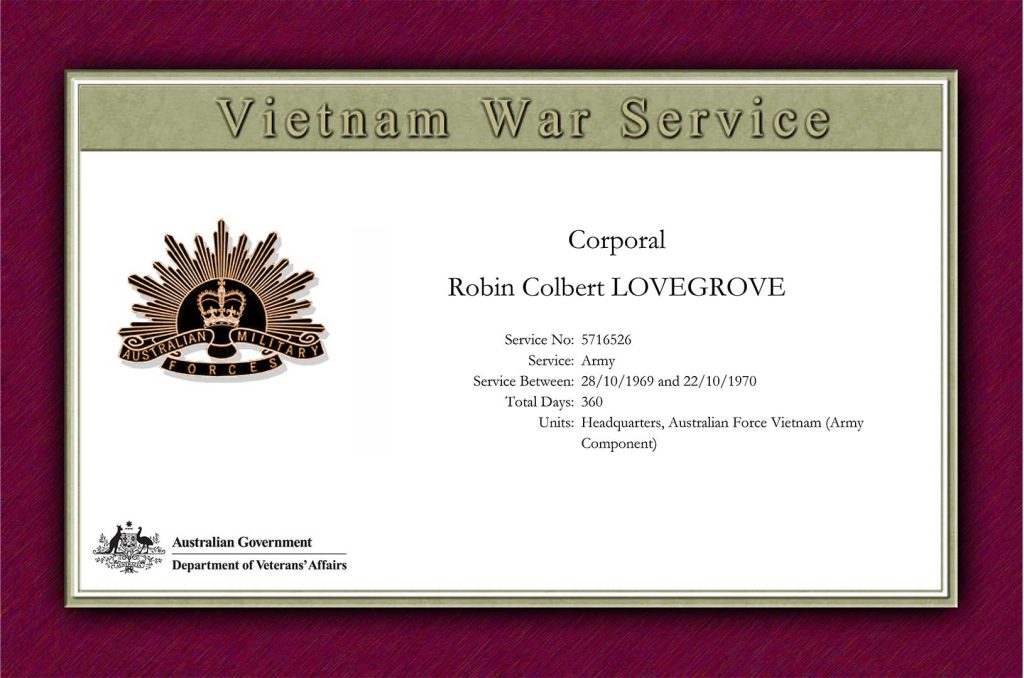
- DLS 1958 – 1964
- Started work at Modern Transport, a subsidiary of Bell Brothers Pty Ltd in South Guildford – to 1965
- National Australia Bank to October 1966
- State Housing Commission 1966 – 1974
- Department of Labour 1974 and WA Industrial Relations Commission onwards
- National Service Training 1969 to 1971
- VIETNAM October 1969 to October 1970
Conscription and Vietnam
In January 1969, I reported to Irwin Barracks at Karrakatta WA and then commenced my Recruit Training at Puckapunyal. From there I was allocated to serve in the Royal Australian Army Service Corps and underwent a 3-month period of Corps Training.
On the 23rd of October, ten months after reporting to Irwin Barracks, I stepped off the aircraft at Tan Son Nhut, Saigon airport. First thing, we were ushered into an area, given the SLR weapons with 3 x 20 round magazines of live ammunition.
When I saw large numbers of mainly American soldiers all fully armed around the tarmac, the reality of what was soon to come really hit home, even though some lectures about Vietnam were provided during the course of my training.
Eleven months before, I was enjoying all that life had to offer: music, fishing, playing footy and cricket, surfing in Margaret River, enjoying the nightclub and family life and a steady well paid government job – now things were a bit different. Even though some historical facts were given about Vietnam, no one knew what Vietnam was all about. It was a big deal when called up, it was to be a new experience and adventure, and I was getting paid to do it.
Before I got on the plane to head off to Vietnam, I had to sign a Will. I never had given much thought to that sort of thing up till then. If you refused to sign, you never went on the plane, you would not have gone to Vietnam.
It could be viewed that signing the Will means you volunteered. But I disagree with that. You go into the Army, go through training, and develop a close camaraderie and relationships with the guys. When your unit gets posted to wherever, Vietnam or even Malaya, you are an integral part of that unit, together with those guys you trained with in the last 12 months. What do you do? You’re part of the group, you go with the group. I had no hesitation to sign the Will. Once you are bonded with that group it would have been a bad call to front your mates and say “sorry guys it’s too dangerous, I’m not going”.
My job was in G Branch, Operations Centre HQ AFV. During that time, I had many an opportunity to get out to Nui Dat, Vung Tau and many local villages within the Phuoc Thuy province, in which psychological operations were also conducted assisting the local villages. I was very fortunate in many ways because when you are working in such a HQ you get to be directly involved keeping abreast of what units and subunits were up to, including future operations with the province.
Civvy life
I came back to Australia in October 1970 and spent 2 months in the Western Command Personnel Depot, Karrakatta. In January 1971, I was back into civvy life.
I found it difficult to assimilate back into civvy life. I spent some time in the repatriation hospital in Hollywood Hospital, I needed surgical treatment.
I applied to join the CMF, Citizens Military Force, now known as the Army Reserves. I did officer cadet training, an 18-months course from 1972 to 1974 and stayed in the ARES until to 1996 and was allocated to serve in the Australian Intelligence Corps to which my selection was greatly influenced by my job in Vietnam.
Looking at it from the ANZAC spirit, we kept the genre of that spirit alive. The De La Salle college ethos is very connected to the ANZAC spirit, the boys who were called up by their country as national servicemen did what your country demanded you to do. That’s life. It’s no different to what the Anzacs did. They did what they had to do for their country, no different to the Anzac spirit in WW1, WW2, and other past and current deployments – the same spirit, different conflicts.
When I arrived back in Sydney, I sent a telegram (through the Army LPO) to my parents that I will be home in 2 days. My sister told me, and still remembers, that the postman knocked on the door and said, “Mrs Lovegrove, I’ve got a telegram from Department of Defence.” Mum wouldn’t open the telegram for fear of what it may say. When my sister arrived home from college, Mum was crying and sobbing and handed her the telegram to open. That’s the impact Vietnam had on families.
I have been asked, “if you had your time again, would you have gone to Vietnam?” My answer every time is, “yes I would”. I believed in what we were doing every step of the way, what we were doing was right.
